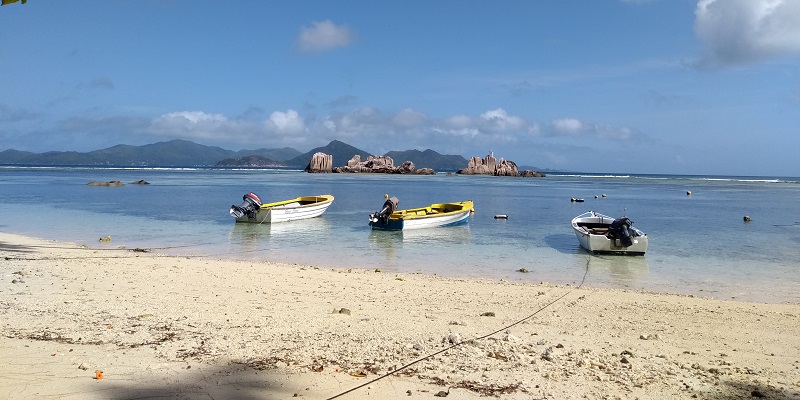Fishers perceptions of change in the benefits associated with coral reefs
Postdoctoral Research Associate Anna Woodhead looks at whether coral reef fishers have perceived changes in the benefits associated with coral reefs.

Tropical coral reefs are often the emblem of a changing and warming world. Some corals are dying and are being replaced by algae. Other types of corals are persisting. This leads to changes in the types of coral and fish found on the reef and could be impacting on the different benefits that people get from the sea. These benefits, also known as ecosystem services, include things like being able to earn a living or having somewhere to relax with friends and family. Knowing the complexity of change on the reef, we wanted to understand whether coral reef fishers had also perceived changes in the benefits associated with reefs. Fishers, like farmers, are directly implicated in ecological change. Their perceptions of change are important both for understanding which changes matter and how they are likely to respond.
We conducted this research across three islands in Seychelles, a tropical island archipelago in the western Indian Ocean. From data spanning over 20 years, we know that reefs are changing in Seychelles because of marine heatwaves but we also know that these reefs underpin locally valued ecosystem services. Specifically, we wanted to know if fishers had perceived changes to four reef associated services that include the habitat that reefs provide for other species (habitat services); the fish caught to eat or sell (fishery services); the physical reef barrier that protects the shore (coastal protection services); and the reef associated places used for recreation and relaxation (recreation services). To find out who was perceiving what, we collected information on fishers socio-economic, demographic, and fishing situations. Finally, we sought to understand which perceived changes matter most to fishers and why.

Coral reef fishers in Seychelles: Depiction of a small-scale fisher at the 2019 Creole Festival (left); Fisher repairing a fish trap at sea (centre); Typical trap catch of reef associated fish species (right) (photo credit: A.J. Woodhead; consent to use photo was provided by the fisher)
The stories that fishers told us revealed key insights on the impacts of changing reefs. The first is that fishers had perceived changes across all four reef-associated services. Although climate impacts on reefs are well documented, few studies have recorded fishers’ perceptions of what these changes mean for them in terms of ecosystem services. The changes that fishers described were also incredibly diverse, including both changes on the reef, changes in fishers’ behaviour and changes in the use of these different services. Fishers’ descriptions of change in fishery services for example, included changes in where the fish are and changes in the way fishers catch fish (e.g. using different bait, fishing in different places). This shows that changes in ecosystem services can take many different forms and that we need diverse methods and approaches to fully capture how ecosystem services associated with reefs are responding to environmental change.
The second insight is that not all fishers are perceiving the same types of change. Fishers who spent time underwater, for example through diving or snorkelling to collect fish traps, perceived a higher number of changes than others. Overall, perceived changes in habitat services were of highest importance. This could provide a common basis for environmental managers and fishers to work together. However, fishers from smaller islands or with fewer alternatives to fishing tended to perceive changes in fishery services as more important. More vulnerable fishers often prioritise services that matter directly for food and income and it’s important that these differences between fishers are considered when managing for future fisheries or reefs.
Finally, the changes that fishers had noticed mattered because they connected to fishers’ wellbeing. This included concerns about food security, changes in fishers’ relationships with the sea and feelings of concern or sadness that fishers felt for their changing environment. Notably, some fishers also reported possible knock-on effects. For example, fishing in different places and often further offshore meant that they had less time to spend with their families, which affected relationships at home. This raises some important questions on how we delineate changes in ecosystem services and how these indirect effects of changing services should best be considered. Approaches that centre on fishers’ wellbeing could be a good starting point for understanding which changes matter and why.
These findings provide important insights on the effects of changing reefs on the wellbeing of coastal communities. They also raise important questions on how we study and think about on-going and future changes in ecosystem services, the benefits (and disbenefits) that we all get from the environment. You can find out more on LCAB’s research in this area under the research programme on Utility.
Thanks to all the fishers who gave up their time to be interviewed and to my co-authors from the Seychelles Fishing Authority, Sustainable Ocean Seychelles, LEC REEFS research group, and Stockholm Resilience Centre.
Funding statement:
This work was funded by a Natural Environment Research Council (NERC) Studentship (Grant code: NE/L002604/1) and supported through a core grant to the Stockholm Resilience Centre by Mistra. Data was collected in partnership with the Seychelles Fishing Authority.
Related links
"Fishers perceptions of ecosystem service change associated with climate-disturbed coral reefs" is published in People and Nature.
Find out more about Anna Woodhead's research.
Related links
"Fishers perceptions of ecosystem service change associated with climate-disturbed coral reefs" is published in People and Nature.
Find out more about Anna Woodhead's research.